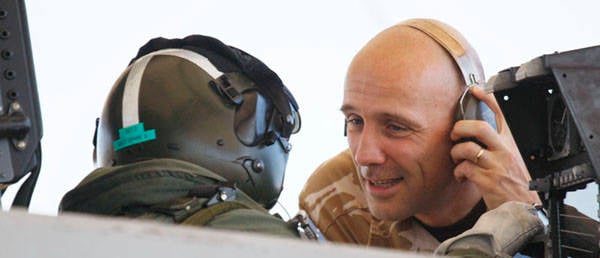Comments of the British military about their participation in operations in the sky over Libya

In connection with the political events in Libya that happened so swiftly, the British Army played a vital role in supporting NATO in stepping up the rebel airborne operation in this troubled country. So say all, without exception, the British military personnel who attacked Libyan soil, reports the British portal army.mod.uk.
“The Royal Air Force with aircraft and helicopters seized airspace. Operation Cast Lead consisted in an effort to end the rule of Colonel Gaddafi and his outrage, which the United Nations considers a crime against humanity. But Gaddafi, who knows the army well and has a wealth of experience, understood how difficult it is to ensure the preservation of life, and turned his forces back, "one of the official representatives of the Ministry of Defense explains the purpose of British military intervention in the operation.
Captain Mick Valborn of the 9 Royal Ulan Regiment was a communications officer (GLO) in Anzola dell 'Emilia - an air base in southern Italy. His work has become a model of all ground tactical knowledge for flight crews working in the sky over Libya. It was he who led the British Air Force aircraft on their targets.
Acting as an air force back-up, the United Kingdom tended to send flights from 12 to 14 per day, according to Captain Welborn.
“I’m only a soldier attached to the Air Force for work, and I appreciate what I’m going to see, and I’ll give the crew everything that the ground forces need to do,” he said after the correspondents asked him about possible remorse about destruction of civilians.
The employee works with the British Air Force in the 2 Squadron (Tornado) and provides technical support to the 3 Squadron Military (Typhoon) to create the required combat potential.
Libyans borrowed Soviet ammunition and tactics, so that many British military could share information about what the Libyan military option would be, since they knew the Soviet tactics in air wars well.
“There were instances when I rushed to the runway,” says Velbourne, “to convey to the crews the most important information at the very last moment, since it was important for saving their lives.”
The participation of the air army, equipped with an Apache helicopter, determined the outcome of the Libyan war. Where the Hurricanes and Typhoons worked, who attacked, observed, discovered targets and carried out reconnaissance, Gadhafi’s army had to capitulate.
One of the recent attacks by a group of Apache helicopters caused destruction in government buildings.
Major General Nick Pope, a spokesman for the British forces in Libya, said: “It was a difficult and very effective attack by Apache crews deep into Libya, about 40 miles (64 km), to hit Gaddafi’s forces, including military vehicles and multiple Colonel’s communications equipment. ”
“Former regime forces continue to threaten Libyan citizens and make it appear as if it aviation NATO strikes peaceful targets. This is a gross provocation, ”says Gary Falls, spokesman for the British Air Force.
Drawing attention to the requirements for the Army and the British Air Force, the commander of the air operation Gary Falls added:
“We must neutralize the danger of the restoration of the Gaddafi regime, but use only air assets for this. Helicopters "Apache" are much closer to the scene of action, than jet aircraft. They have the ability to distinguish people on earth. This proves the need to have such machines for modern warfare. They perfectly complement the attacks of airplanes from the air and help those to define targets more accurately. Gaddafi has no chance! ”
Based on these comments, we can conclude that the UK military seriously believe that they fulfilled good goals in Libya. And, as you can see, they are little concerned that during the operation, thousands of civilians died from missiles fired from British aircraft and helicopters.
Information